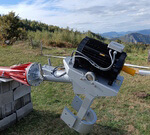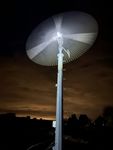Cutting-Edge Technology at Block Island Wind Farm Helping Scientists Track Bird and Bat Activity Offshore
Deepwater Wind is partnering with researchers from the U.S. Fish and Wildlife Service, the University of Rhode Island (URI) and the University of Massachusetts (UMass) Amherst to assist in their studies of bird and bat activity off the Atlantic Coast. The studies, funded by the U.S. Bureau of Ocean Energy Management (BOEM), provide data on offshore movements of high priority species to inform conservation efforts.
In August, Deepwater Wind installed a wildlife tracking station on the easternmost foundation platform at the Block Island Wind Farm, three miles off the coast of Block Island, R.I. The tracking station contains four antennas, plus a receiver that collects data on the migrating patterns of birds and bats that scientists have previously tagged with tiny, very high-frequency (VHF) transmitters, weighing less than 1.5 grams each. These transmitters provide data on any tagged species that fly within a 20-mile radius of the wind farm.
This new technology has been implemented in a coordinated network across eastern North America in the last five years, helping researchers accurately track wildlife movement as they migrate along the Atlantic Coast.
“Deepwater Wind puts leading-edge science and technology to work to solve our country’s energy challenges,” said Deepwater Wind CEO Jeffrey Grybowski. “Our Block Island Wind Farm has not only pushed the boundaries of clean energy in the U.S., it’s also deepened the understanding of the marine environment. Now it’s our privilege to be part of cutting-edge research that will help scientists learn more about some of the country’s most important bird and bat species.”
This station is among more than 40 tracking stations along the U.S. East Coast, including two receiving stations located on the southern coast of Block Island. The new tracking station at the Block Island Wind Farm will allow researchers to collect more detailed data on wildlife movements in the Rhode Island Sound area. The stations will be active until mid-October this year, and then re-deployed next spring.
U.S. Fish and Wildlife Service biologist Dr. Pam Loring said the tracking stations are operated in collaboration with the Motus Wildlife Tracking Network, a coordinated system to track migratory animals marked with digital VHF transmitters throughout the Western Hemisphere. The Motus network is led by Bird Studies Canada in partnership with more than 120 partners.
“This is an exciting opportunity to pilot digital VHF technology for tracking movements of birds and bats at the first offshore wind energy facility in the United States,” Loring said. “Results from this study will help agency and industry partners balance renewable energy development with conservation of focal wildlife species and will guide the use of this technology at additional offshore sites in the future.”
“This is a great partnership between government, industry, and scientists to provide vital information for future offshore wind development decisions,” said BOEM Environmental Protection Specialist Dr. David Bigger.
“This newest station on the Block Island Wind Farm, coupled with the two stations on Block Island, represents the first attempt anywhere in the world to assess fine-scale movements of birds and bats near an active offshore wind farm,” said Dr. Peter Paton of the University of Rhode Island. “Thus, there is considerable interest from biologists around the United States and across the planet on the results of this research.”
“We are thrilled to be partnering with Deepwater Wind on this project,” said Dr. Curt Griffin of UMass Amherst. “Only with such site-specific data on bird movements will we be able to assess the potential risks to marine and migratory birds from offshore wind farms, providing essential data for developing effective conservation strategies for birds and offshore wind energy development in the Northeast.”
“The Block Island project offers a tremendous opportunity to study the potential impacts from offshore wind projects at a scale where we can make mid-course corrections, if we need to, for larger projects,” said Grover Fugate, executive director of the Rhode Island Coastal Resources Management Council, which permitted the Block Island project through its R.I. Ocean Special Area Management Plan (Ocean SAMP). “By working cooperatively on these studies we can bring the best science to bear on this developing industry, to ensure it’s done in a responsible fashion. ”
U.S. Fish and Wildlife’s Division of Migratory Birds, in collaboration with URI and UMass Amherst and with funding from the U.S. Bureau of Ocean Energy Management, have been deploying telemetry technology since 2013 to track the movement of high-priority bird and bat species such as common terns and American oystercatchers; federally threatened species such as piping plovers and the rufa Red Knot; and the federally endangered Roseate Tern.
- Source:
- Deepwater Wind
- Author:
- Press Office
- Link:
- dwwind.com/...
- Keywords:
- USA, Block Island, offshore, bird, bat, BOEM, Deepwater Wind, study


























